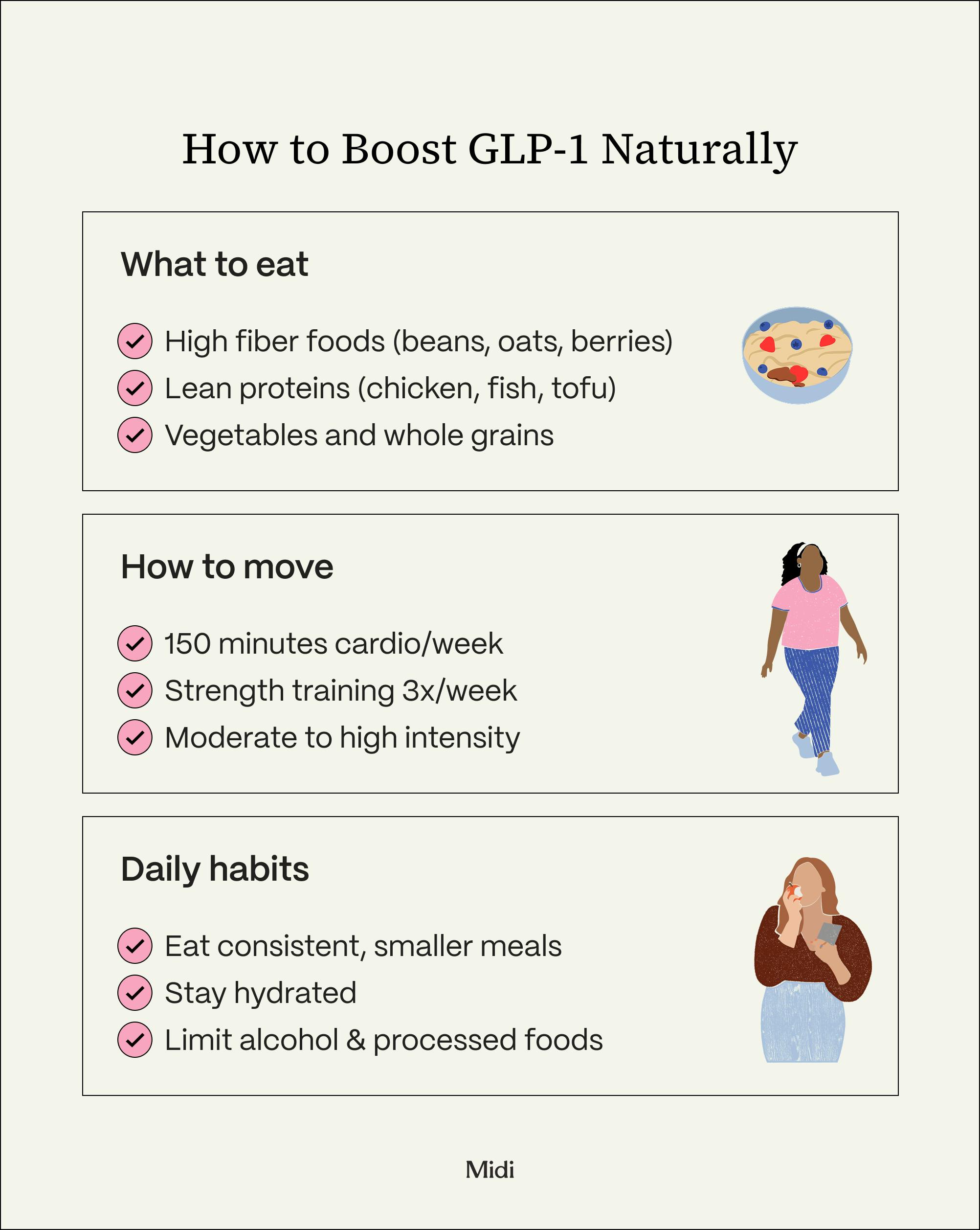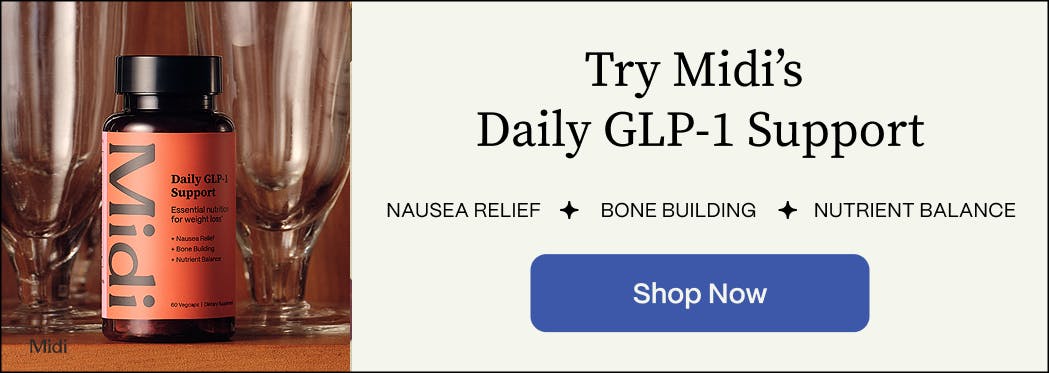It's hard to ignore all the buzz about GLP-1 medications, and now there's a growing class of GLP-1 supplements popping up everywhere. But do they actually work? And are they worth trying?
At Midi, we know these questions may be especially top of mind for women on the cusp of perimenopause and menopause. Midlife metabolism can feel like it's playing tricks on you—weight creeping up, appetite all over the place, and your body seemingly working against everything you're trying to do. So when it comes to extra support, it's important to understand what's real and what's just hype. Midi clinicians are trained to address the effects of hormonal change, including stubborn weight gain, so you never have to go it alone.
These days, it’s nearly impossible to avoid chatter about GLP-1s. From celebs like Serena Williams to your best friend’s sister, everyone seems to know someone who’s on one. And now that GLP-1 prescriptions have become the hot topic for weight loss, supplement companies are jumping on the bandwagon with products claiming they can do the same thing.
So we rolled up our sleeves and dug into the actual science. Here's the real deal on GLP-1s and why it matters for your midlife metabolism, how prescription medications stack up against supplements, and whether these over-the-counter options can actually help with blood sugar, appetite, weight management, or side effects.
What Is a GLP-1?
GLP-1 stands for glucagon-like peptide 1. It’s a hormone your body naturally produces that’s involved in appetite regulation, blood sugar control, and digestion. Eating food triggers the release of GLP-1 which tells your brain "Hey, we're good here, you can stop eating now." Pretty cool, right? As a result, your appetite decreases, and you put the fork down.
The problem is, some people don't make enough GLP-1, which might contribute to weight gain and obesity. It's like having a broken "full" signal—not exactly helpful when you're trying to manage your weight.
Today, you can also take prescription medications called GLP-1 receptor agonists, such as Ozempic (indicated to treat diabetes) and Wegovy (indicated for weight loss). This class of medications sounds pretty new because the excitement surrounding the drugs (and celeb interest) has exploded in recent years, but GLP-1s have been around for 20 years.
Understanding GLP-1 Supplements vs. Prescription Medications
Here's where things get interesting. A prescription GLP-1 medication is the real deal—you get it from your doctor after they've looked at your health, your goals, and figured out if it's right for you. This can come in the form of injections or oral alternatives. You can also take them in a range of doses.
GLP-1 supplements, on the other hand, usually contain ingredients like green tea extracts and other herbs that may support your weight loss efforts, though they aren’t as thoroughly studied.
If you are interested in using a supplement, talk with a healthcare professional, like a Midi clinician, first. They can answer your questions about whether a personalized GLP-1 medication or supplement is right for you based on your health, lifestyle habits, and weight loss goals. What’s more, a supplement doesn’t take the place of diet, exercise, sleep, and stress management—all things that are needed to make weight loss happen—so having a clinician by your side can help you create a well-rounded plan that sets you up for success during the menopausal transition.
Weight Loss Success Stories
Do GLP-1 Supplements Actually Work?
The straight answer: They're not going to work like prescription medications. Some have a bit of research backing them up, but honestly, the jury's still out on whether many of these supplements do much of anything at all. Some so-called GLP-1 supplements for weight loss may be mildly effective. It depends on your health needs and goals whether or not a GLP-1 supplement is appropriate for you.
Natural Supplements That May Increase GLP-1
Let's cut through all the marketing noise and look at what the science actually says about the most popular "GLP-1 supplements." Just remember—the research is pretty limited (think small studies, animal research), and these are definitely not replacements for prescription medications if that's what you and your doctor decide you need. In fact, they may be better suited to complement your GLP-1 journey, instead of replacing it.
- Berberine: Berberine is a compound found in plants like goldenseal and barberry. This is, by far, the most popularly cited “GLP-1 supplement.” One research review suggests that people did lose weight—about 1.8 pounds. (The best results were seen in those who were overweight. Research suggests you need to take more than 1 gram per day for more than 8 weeks.) That said, problems with the limited research means that we don’t know how effective it really is. Berberine may affect gut bacteria and digestion to increase peptides associated with appetite (including GLP-1), and regulate genes and blood sugar production from the liver.
- Probiotics: Early research suggests that probiotics—live microorganisms in your digestive system—may promote cells in the intestines to secrete GLP-1, thus improving insulin function. Probiotics ferment fiber during digestion, stimulating the production of short-chain fatty acids (SCFAs) that trigger GLP-1. One review found that Lactobacillus and Bifidobacterium are bacterial probiotics that promote GLP-1. Strains of these bacteria have also been linked to weight loss, though we need clinical trials to develop recommendations for probiotics and weight loss.
- Psyllium: You know this one—it's the fiber in Metamucil that helps with, well, keeping things moving. There is evidence that the fiber can help slow carbohydrate digestion and absorption, increasing GLP-1, making it potentially effective for improving blood sugar control. When it comes to weight loss, one review and meta-analysis found that taking psyllium before meals for about five months lead to more than a four-pound weight loss in those with overweight and obesity.
- Other herbal supplements: Cinnamon, yerba mate, capsaicin, EGCG (green tea), and curcumin are just some of the other potentially promising plant compounds that may enhance GLP-1 secretion and benefit blood sugar control, insulin resistance, and weight loss. Again, more research is needed to understand just what type of benefit (if any) these can deliver and the optimal way to include them in a weight loss routine. Using these alone (without diet and exercise) is unlikely to make any difference.
Supplements to Support GLP-1 Medications
While some supplements try to promise you the same benefits of, another overlooked—but more helpful category—are supplements that can help ease the side effects that can come with prescription weight loss meds:
- Nutrient deficiencies: When you eat less in general, you may not be getting enough key vitamins and minerals through your diet
- Gastrointestinal issues: Nausea, bloating, and upset stomach are oft-cited side effects of GLP1s, which may result from slower stomach emptying (this helps you feel fuller longer but also may make you a bit uncomfortable in the process)
These issues can be enough to stop using the medications, which can cause some people to abandon their weight loss journey. As a result, they may miss out on the positive health benefits, including lowering diabetes risk, improving cardiovascular health, and reducing inflammation.
Supplements, like Midi’s Daily GLP-1 Support, can help ease the nausea, digestion troubles, and brain fog that can make it hard to stick with weight loss treatment. With ginger and B6 to calm the stomach, peppermint oil and enzymes to support smooth digestion, and essential nutrients like D3, K2, and methylated B9 to replenish lost nutrients, this formula supports your bones, steady energy, and mental clarity while on GLP-1s.
Foods and lifestyle practices to naturally boost GLP-1
Here's the thing about GLP-1 medications—even if you're taking them, you still need to eat well and exercise. The medication isn't magic; it works best when paired with healthy habits.
The American College of Lifestyle Medicine recommends focusing on fruits, vegetables, whole grains, dairy, lean proteins, nuts, seeds, and healthy fats like olive and avocado oil. Eating smaller, consistent meals, staying hydrated, and keeping alcohol in check all help too.
This type of fiber- and protein-rich pattern boosts satiety after eating.
In addition, the organization recommends minimizing or avoiding refined carbohydrates, sugar-sweetened beverages, red and processed meats, most fast food, and sweets and savory snacks.
Exercise is huge for healthy GLP-1 levels too. Physical activity helps your gut bacteria do their job better, which supports your natural GLP-1 response. It also helps create those beneficial compounds that improve insulin sensitivity. Both moderate and high-intensity exercise seem to give GLP-1 a boost.
If you are taking a GLP-1 medication, experts recommend strength training at least three times per week in addition to 150 minutes of aerobic exercise.

Potential Benefits of Supporting GLP-1 Naturally
Here's what's great about the natural approach—all those healthy habits that support your body's own GLP-1 (eating well, getting fiber and protein, exercising regularly) are exactly what healthcare professionals recommend for anyone striving to live a healthy lifestyle. These habits can help:
- Support weight management and appetite regulation
- Improve blood sugar control and overall metabolic health
- Enhance digestive health and comfort
That said, many women find that lifestyle changes alone don't get them where they want to be health-wise or weight-wise, which is why they consider GLP-1 medications, especially when hormonal changes lead to more weight gain or fat redistribution (hello, meno belly). The prescription drugs do tend to lead to more significant weight loss.
The winning combo? GLP-1 medication plus healthy lifestyle habits. And depending on your situation, certain supplements might be helpful too—just run it by a healthcare professional, like a Midi clinician, first.
Key Takeaways
- GLP-1 is your body's natural "I'm full" hormone, and lower levels might contribute to weight gain
- If you're dealing with perimenopause or postmenopause weight gain, cravings, blood sugar issues, or insulin resistance, extra support can help with achieving and maintaining a healthy weight
- There's limited evidence that some supplements like fiber, probiotics, and berberine might help boost GLP-1 levels, though they can support weight loss in other more well-researched pathways.
- Supplements promising to give you the same results as prescription medications are overhyped. If you're looking for the kind of results you hear about with weight loss prescriptions, supplements probably won't cut it
- Talk to a healthcare professional, like a Midi clinician, who can help you explore all your options—whether that's prescription medications, lifestyle coaching, supplement guidance, or a combination of all three.
Frequently Asked Questions (FAQs)
Do any GLP-1 supplements work?
There is limited evidence that supplements like berberine, fiber, and probiotics may help raise GLP-1 in the body. Using them may promote mild weight loss results.
Can you buy GLP-1 supplements?
Yep, you can find plenty of over-the-counter products claiming to boost GLP-1 or work like "natural" GLP-1 medications. Just keep your expectations realistic—the evidence for most of them is pretty thin.
How can I increase my GLP-1 hormone naturally?
Eating food naturally triggers GLP-1 release, especially foods rich in fiber and protein. These help you feel full and keep blood sugar stable. Regular exercise also helps boost GLP-1 and makes prescription GLP-1 medications more effective if you're taking them.
Is there a vitamin that works like Ozempic?
Unfortunately, there is not. Ozempic is an FDA-approved prescription medication for the treatment of type 2 diabetes alongside diet and exercise. There is no evidence that taking a vitamin or supplement delivers comparable results as Ozempic.
If you’re in perimenopause or menopause and want guidance from clinicians who specialize in women’s midlife health, book a virtual visit with Midi today.
Hormonal change is at the root of dozens of symptoms women experience in the years before and after their period stops.
Our trained menopause specialists can help you connect the dots to guide you towards safe, effective solutions.
Whether you need personalized guidance or a prescription routine to tackle symptoms—including vaginal dryness and irritation, brain fog, hot flashes, sleep trouble, mood swings, and weight gain—we’ve got you covered.
Midi’s mission is to revolutionize healthcare for women at midlife, wherever they live and whatever their health story. We believe that starts with education, to help all of us understand our always-changing bodies and health needs. Our core values guide everything we do, including standards that ensure the quality and trustworthiness of our content and editorial processes. We’re committed to providing information that is up-to-date, accurate, and relies on evidence-based research and peer-reviewed journals. For more details on our editorial process, see here.






